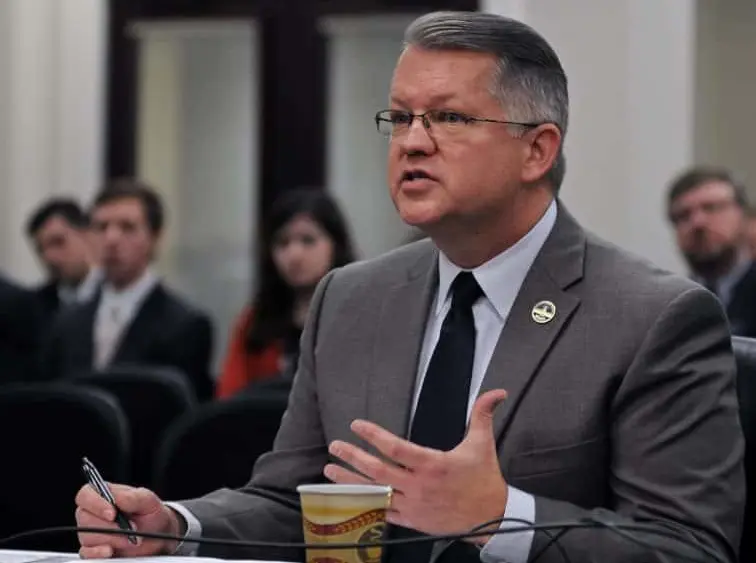FRANKFORT- A $22.5 billion state spending plan that would shore up funding for
public education and public safety while ensuring that Kentucky meets its obligation
to fund the state employees’ and teachers’ retirement systems passed the state House
today on a 76-15 vote.
House Appropriations and Revenue Chair Steven Rudy, R-Paducah, said House Bill 200
meets the “overall theme of what the Governor (Bevin) was committed to do” by fully
funding the state pension systems, keeping the state debt percentage below six
percent, and building the state’s “rainy day” emergency fund up at least $250
million.
Rudy said he hopes any agreements that need to be reached on the budget with the
Senate are reached in a “timely fashion where we will be able to keep our
constitutional ability to override (any) vetoes.”
Most state agencies will take a 6.25 percent baseline cut from their budgets in the
biennium as recommended by the governor while several areas will see additional
funding, especially for public pensions for public employees and teachers. HB 200
would increase funding for the Kentucky Retirement Systems by $774.5 million and the
Kentucky Teachers’ Retirement System by $89.1 million to meet the full actuarial
required contribution (or ARC) for state employee and teacher pensions. Full funding
for teacher retirement would be provided at the school district level while health
coverage for retired teachers would be secured with an additional $59.5 million in
the bill, which would also ensure funding of health care for active school
employees.
For K-12 education, HB 200 would boost base per-pupil funding for K-12 education, or
SEEK, to a record level of $4,055 in the first year of the biennium and $4,056 in
the second year. It would also increase school transportation funding to $127.8
million in each year of the budget cycle to restore funding that was not found in
earlier budget proposals.
More than $100 million is proposed in the bill for new hires that would help
implement proposed adoption and foster care reforms in HB 1, a bill that passed the
House on Wednesday. And additional funding for public safety is also included,
including funds for 260 new cruisers and 800 new rifles for state troopers and
additional funds for legal aid and day treatment for troubled juveniles.
Voting in support of HB 200 was Rep. Wilson Stone, D-Scottsville, who said he
supported the budget plan for its value to public education.
“I rise to say I voted ‘yes’ because I think we made a statement today for public
education in Kentucky,” said Stone. “The way to a better Commonwealth (is) through
education.”
Retired public educator Rep. Derrick Graham, D-Frankfort, voted against the proposal
for what he said was its use of the state’s public employees’ health plan transfers
to balance the plan.
“You’re saying, ‘Well, this is a vote for education.’ Lord knows, as a person who’s
come out of education, I’m supporting education and I try to support education each
and every time,” said Graham. “But what really galls me is we’re taking funding for
the health care of our public employees to try to balance this budget.”
Kentucky prohibits revenue measures from being included in its state spending bills,
so the revenue increases for the next two-year state budget were approved separately
by state lawmakers. The funding required to carry out the appropriations in HB 200
is found in HB 366, approved by the House today on a vote of 68-25.
The revenue bill, as HB 366 is called, includes a couple of tax increases – a
50-cent per pack increase in the cigarette tax beginning this July and a 25-cent per
dose fee on opioids at the distribution level. Both revenue sources are projected to
rake in an extra $377 million over the two-year budget cycle for the Commonwealth.
(Other revenue changes in HB 366 would bring in around $123 million in additional
revenue over the next two years, for a total of around $500 in new revenue over the
biennium.)
Voting in support of both HB 366 and HB 200 was Rep. Jason Nemes, R-Louisville, the
chair of the House Budget Review Subcommittee on Justice, Public Safety and
Judiciary. Nemes said the revenue bill and budget plan in HB 200 has been praised by
educators in his public school district and beyond.
“You should vote yes on this, and you should vote yes on the budget. Stand with the
teachers and stand with the highest education funding in the history of this
Commonwealth,” Nemes said.
Both bills were also supported by another Louisville lawmaker, House State
Government Chair Rep. Jerry Miller who said other options should be considered when
looking for future revenues. Miller has filed HB 229 this session which proposes
amending the state Constitution to allow regulated casino gaming in Kentucky.
“Keep in mind we have a stream of revenue we are not tapping and that is gaming. We
have an opportunity to have an income stream,” said Miller, R-Louisville. “We need
to wake up and recognize that casinos would help the urban areas generate tax
revenue to support the rest of the state.”
Also approved today by the House were the state Legislative and Judicial budgets,
which were passed without much fanfare by House votes of 83-7 and 84-8 respectively.
All four bills now move to the Senate for its consideration.







